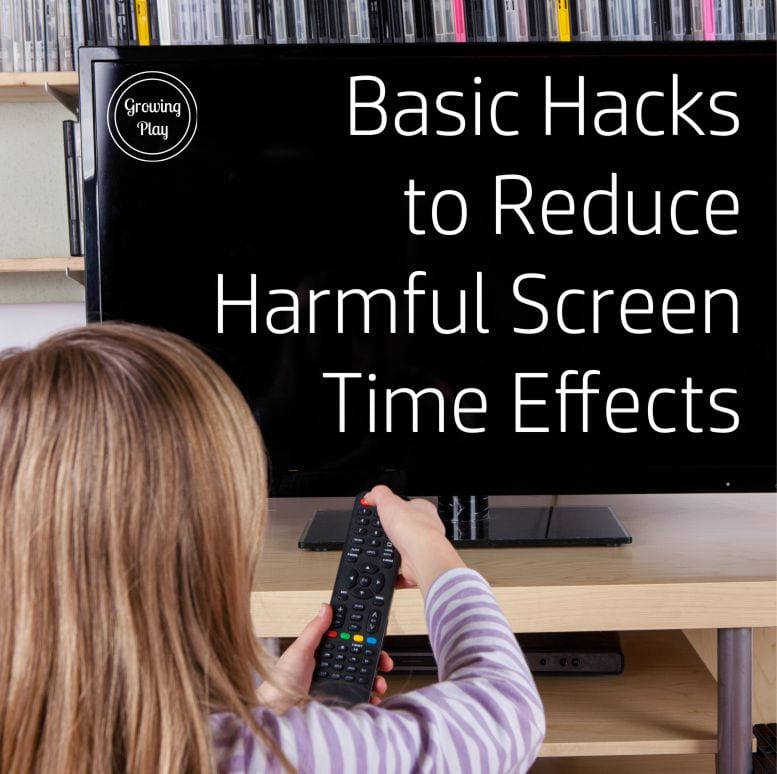5 Hacks to Reduce Harmful Screen Time Effects

As you probably know, our family loves to camp. Summer camping is how we refresh, renew, and get ready for a new school year. I love to watch my kids just be kids; running, swimming, playing and learning the way they want to.
I have noticed a change in my kids as they grow, however. They are much more reliant on their friends, and social connections are hugely important. As much as I hate to admit it, their phones help to facilitate those necessary connections. For our older children we were able to avoid phones until they were late into high school – not all their friends had one, people still had land lines, etc. Today, that is no longer true where we live.
Smartphones and other screened devices are making their way into our children’s hands and pockets, whether we like it or not.
That’s not to say I’m opposed to connection, friendship or social play. In fact, I feel like it is a sign of a maturing brain that parents may not be the immediate go-to anymore. However, I do feel like there should be ground rules that can help reduce the harm these devices can cause. Here are some of my basic hacks to reduce harmful screen time effects.
Take Breaks To REduce Screen Time Effects
Encourage your child to take breaks away from their screen. Create a “drop zone” in your home where screens go and stay. Designate an area for all electronics to live when they are not in use. Ours is right by the door where they enter the house. Full disclosure – it is a complete mess haha! The mail and all the devices go there to charge. Yikes!
This will not only help your child develop a healthy relationship with their technology, but will help their eyesight, posture, and many other things that can be negatively affected by too much screen time.
No Screens in the Bedroom
Keep phones, tablets, and computers out of the bedroom. Did you know that The children who had a greater engagement in screen time have a later sleep onset? When children have significantly greater time spent in nonscreen sedentary activities and self care before sleep they have an earlier sleep onset.
Sleepy kids = mom win over here!
Use Built-in Helpers
If you older children need to use screens for homework and projects for longer periods of time, most devices now have some kind of a “Dark Mode” or a night-time light adjustment feature. Look into these, and encourage your kids to do the same. Eyes that get fatigued easily (most kids, teenagers, and middle-aged moms) might be helped by switching to “Dim” or “Dark” mode if work must continue. Also, look into the “Night Shift” option – which turns screens to a more gentle yellow/tan tone as the sunsets.
Schedule Activity Breaks
Model for your children how to effectively schedule activity breaks into your routine. One of the biggest problems with screen time is that most often, it is done while sitting down. Encourage your children to take breaks with you. Set a timer, and when it goes off, put the screens down. Go do something fun for everyone or have a family game night.
Encourage Open Communication
One of the biggest concerns around children and screen time is not the device itself, but the world it opens our little ones (or not so little ones) up to.
Cyberbullying, depression, and anxiety are all negative byproducts that should be part of an ongoing discussion around the privilege of owning a connected device. If my child can’t be mature enough to have an open conversation with me about the effects of negative behavior online, then I can assume they are not mature enough to handle the device, and it will be gone. Period, end of story. I will be the “Mean Mom” every time when it comes to my child’s safety.
Screen time is such a hot button topic, it is sometimes hard to come to an agreement. But if there is one thing I think everyone can agree on, it is that we all want what is best for our children. We want them to grow up to become mature, well-rounded adults who are able to contribute to society. Parents do the best they can with what they have. Sometimes screens are part of that equation, and sometimes they aren’t. In our home, we try to model a balanced approach to screens, with the hope that sometimes we are having so much fun as a family that they forget about their screen entirely. After all, what is better in life than a good ghost story around a campfire with the sweet smell of roasted marshmallows still fresh in the air? I can’t think of much right now…
Which of these basic hacks to reduce screen time effects can you see yourself trying? What else have you tried that has worked (or not)?
Need ideas for when the children unplug?
Here are some of our most popular resources for when you want to unplug and reduce the harmful screen time effects.



